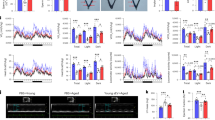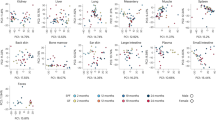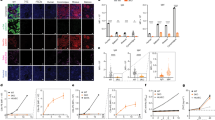Abstract
GROWING rats1, guinea-pigs2, rabbits3 and possibly human beings4 require dietary arginine for optimum nitrogen retention and normal growth. Adult men5, dogs6 and rats1 do not require dietary arginine for nitrogen equilibrium and it is assumed that adults of other species also meet all of their arginine needs from synthesis within tissues. Kennan and Cohen7 have suggested, however, that the Krebs–Henseleit urea cycle, in which arginine is an intermediate, operates at near maximum capacity for ammonia (that is NH3+NH4+) detoxification in immature rats. Sperm, which contain a large concentration of arginine, decrease in numbers and motility when collected from mature men or rats fed arginine-deficient diets8,9. Free orotic acid found normally in milk10 cannot be readily detected in normal tissues11. It is barely detectable in normal urine12 unless orotate is fed (our unpublished results). We have observed profound orotic aciduria in arginine-deficient growing rats13 and in ammonia-intoxicated rats (unpublished results). The accumulated evidence suggested that endogenous synthesis provides limited reserves of arginine for detoxifying ammonia in mature animals and that important metabolic consequences might ensue if their diet lacked arginine. We report here experiments with rats which clearly show that marked increases in orotate and urea excretion are sensitive indicators of dietary arginine deficiency, regardless of age and body size. The data also show that the usual methods of determining amino acid needs for adult mammals fail to reveal biochemical changes caused by diets lacking available arginine.
This is a preview of subscription content, access via your institution
Access options
Subscribe to this journal
Receive 51 print issues and online access
$199.00 per year
only $3.90 per issue
Buy this article
- Purchase on Springer Link
- Instant access to full article PDF
Prices may be subject to local taxes which are calculated during checkout
Similar content being viewed by others
References
Scull, C. W., and Rose, W. C., J. biol. Chem., 89, 109 (1930).
Heinicke, H. R., Harper, A. E., and Elvehjem, C. A., J. Nutr., 57, 483 (1955).
McWard, G. W., Nicholson, L. B., and Poulton, B. R., J. Nutr., 92, 118 (1967).
Albanese, A. A., in Protein and Amino Acid Requirements of Mammals (edit. by Albanese, A. A.), 119 (Academic Press, New York, 1950).
Rose, W. C., Haines, W. J., Johnson, J. E., and Warner, D. T., J. biol. Chem., 148, 457 (1943).
Rose, W. C., and Rice, E. E., Science, N.Y., 90, 186 (1939).
Kennan, A. L., and Cohen, P. P., Proc. Soc. exp. Biol. Med., 106, 170 (1961).
Shettles, L. B., Fertil. Steril., 11, 88 (1960).
Shettles, L. B., Proc. Third Annual Conference on Sperm Biology, 28 (National Committee on Maternal Health, New York City, 1942).
Hallanger, L. E., Laakso, J. W., and Schultze, M. O., J. biol. Chem., 202, 83 (1953).
Hurlbert, R. B., and Potter, V. R., J. biol. Chem., 209, 1 (1954).
Kesner, L., J. biol. Chem., 240, 1722 (1965).
Milner, J. A., Wakeling, A. E., and Visek, W. J., J. Anim. Sci., 35, 220 (1972).
Rogers, Q. R., and Harper, A. E., J. Nutr., 87, 267 (1965).
Bucher, N. L. R., and Swaffield, M. N., Biochim. biophys. Acta, 129, 445 (1966).
Stajner, A., Suva, J., and Musil, F., Spectalia, 13, 116 (1968).
Foster, L. B., and Hochholzer, J. M., Clin. Chem., 17, 921 (1971).
Chaney, A. L., and Marbach, E. P., Clin. Chem., 8, 130 (1962).
Wergedal, J. E., and Harper, A. E., J. biol. Chem., 239, 1156 (1964).
Albanese, A. A., in New Methods of Nutritional Biochemistry (edit. by Albanese, A. A.), 44 (Academic Press, New York, 1970).
Topping, D. C., Prior, R. L., Milner, J. A., Hintz, H. F., and Visek, W. J., Fed. Proc., 32, 893 (1973).
Milner, J. A., Wakeling, A. E., and Visek, W. J., Fed. Proc., 31, 716 (1972).
Smith, jun., L. H., Sullivan, M., and Huguley, jun., C. M., J. clin. Invest., 40, 656 (1961).
Greenstein, J. P., Wintz, M., Gullino, P., Birnbaum, S. M., and Otey, M. C., Arch. Biochem. Biophys., 64, 342 (1956).
Brown, jun., G. W., and Cohen, P. P., J. biol. Chem., 234, 1769 (1959).
Jones, M. E., in Advances in Enzyme Regulation (edit. by Weber, G.), 9, 19 (Pergamon, New York, 1971).
Bourget, P. A., Natale, P. J., and Tremblay, G. C., Biochem. biophys. Res. Comm., 45, 1109 (1971).
Cohen, P. P., The Enzymes (edit. by Boyer, P. D., Lardy, H., and Myrback, K.), 6, 477 (Academic Press, New York, 1962).
Author information
Authors and Affiliations
Rights and permissions
About this article
Cite this article
MILNER, J., VISEK, W. Orotic Aciduria and Arginine Deficiency. Nature 245, 211–213 (1973). https://doi.org/10.1038/245211a0
Received:
Issue Date:
DOI: https://doi.org/10.1038/245211a0
This article is cited by
-
Liver lipid alterations in rats fed arginine deficient diets
Lipids (1978)
-
Effects of alloxan on orotic acid and glycogen content in various vertebrate species
Experientia (1978)
-
Leucocyte specific antinuclear antibodies
Virchows Archiv B Cell Pathology (1975)
Comments
By submitting a comment you agree to abide by our Terms and Community Guidelines. If you find something abusive or that does not comply with our terms or guidelines please flag it as inappropriate.



